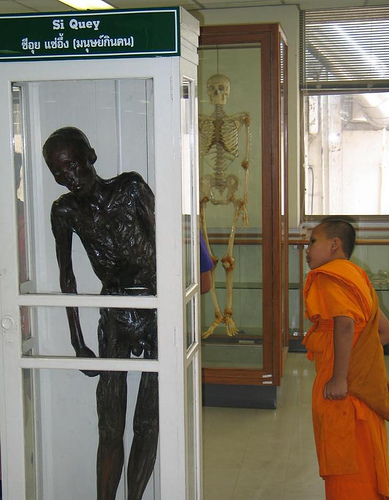Forensic Science

Last weekend we visited the Siriraj Forensic Science museum in Bangkok (pronounced Silly-lot). Forensics is the science of crime. Why are we here?
I am the science officer for the Vidocq Society (pronounced Vee-doc), an international forensic think-tank for solving cold case murders. The Vidocq Society is named after the eighteenth century French detective Eugène François Vidocq, who is considered the founder of modern criminology. Vidocq was a former fugitive and police informant, and expert in surveillance and disguise. In his career-reversal, working in crime prevention, Vidocq was the first to make plaster casts of foot and shoe impressions, and introduced record-keeping and the study of ballistics into police work.
The Vidocq Society allows 82 members by invitation only. As the science officer for the Vidocq Society, my job is to make sense of some of the physiology and facts about the body used (and often not used) in forensic investigations. Real forensics is not like television forensics and often techniques shown on television are exaggerated, applied incorrectly, interpreted badly, or just false. Part of my job is to learn enough to help make sure we don’t do the same in real life.
It is important to check things, even if accepted as fact. For example it is not true that you can tell when someone died from their body temperature or stiffness. You can’t just check the books. Many of the most held old fallacies, were things we learned in school and from forensic books. Health and fitness is like that too. We just need to look a little further to learn how things really work.
- Forensic Anthropology and Bone Density
- Body Farm Not Just For Halloween
- Time of Death From Body Temperature?
Read success stories and send your own.
See if your answers are already here - click Fitness Fixer labels, links, archives, and Index.
For personal medical questions - Replies to Medical Questions.
Limited Class space for personal feedback. Top students may earn certification through DrBookspan.com/Academy. More fun in Dr. Bookspan's Books.

0 Comments:
Post a Comment
<< Home